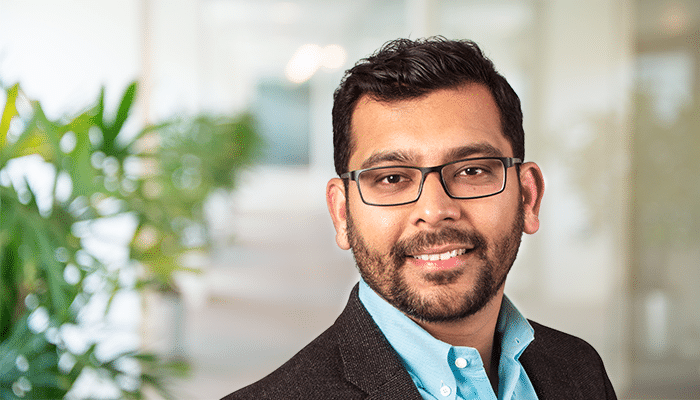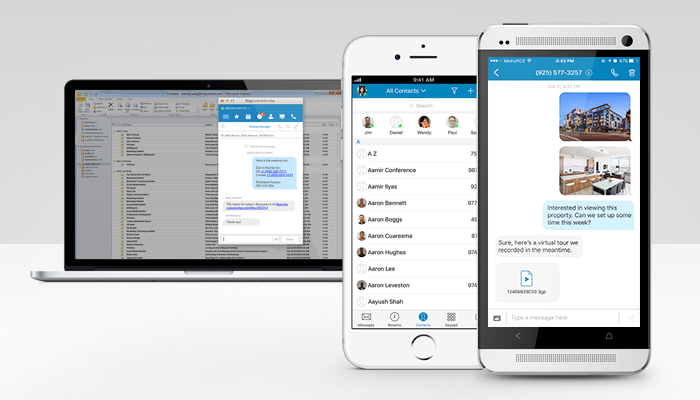
Last month, Mitesh Dhruv stepped into the role of CFO at RingCentral. In his 5 years at the company, he has served in a variety of finance leadership positions, most recently as Senior Vice President, Finance and Strategy. Mitesh’s career path spans investment banking, corporate finance, and accounting. His job as an equity analyst at Merrill Lynch was the catalyst that brought him to RingCentral. I had the opportunity recently to sit down with Mitesh to talk about how he came to RingCentral, the role his upbringing played in guiding him throughout his professional journey, and his leadership advice for young professionals.
Your journey is not very traditional. You’ve done a lot of different things leading up to this role of CFO, both from an educational and professional perspective. And all this by the age of 39. Can you walk us through this journey?
I certainly took a bit of an eclectic and scenic route both in education and profession. Growing up with modest means in a diverse, fast-paced city like Mumbai in India, I learned the need for a few key things early on: survival, speed, and focus. My natural style is to have intense energy to learn, adapt, and expand my knowledge. Over time I accumulated learnings and professional experience in multiple areas.
It was certainly intense as I had several things going on around the time I was pursuing my undergraduate studies, Chartered Accountancy, which has a typical pass rate of 10–15%; a full-time internship; and I was taking classes for a law degree. My typical day started at 5 a.m. at law school, followed by internship during the day, then off to Chartered Accountancy classes in the evening, and ended with more late night studying. By 22, I had completed my undergraduate degree in finance, a postgraduate degree as a Chartered Accountant, as well as taken classes in law.
I then started my career at PricewaterhouseCoopers in India helping public companies gain access to US capital markets. It gave me exposure to understanding US accounting rules. I took that opportunity to study and travel to the US and qualify to become a CPA (Certified Public Accountant), all the while holding a full-time job. Once I was a CPA, I moved to California.
How did you end up on Wall Street then? It’s quite a different route from accounting?
I’ve always had a penchant for understanding capital markets and looking at different business models. So, while working as a CPA in audit across several industries, I studied and took the CFA (Certified Financial Analyst) exam. That was a lot of work—studying alongside working 50–60 hours a week. But this gave me an avenue to enter Wall Street. I joined Merrill Lynch as an equity analyst in San Francisco. My pitch to them was that I was young (I was 28 then), had 5 years of professional experience, and was reasonably qualified being a Chartered Accountant, CPA, and CFA.
What sector did you cover at Merrill and what was your experience there like?
I was lucky to join the research group at Merrill Lynch, which included fast-growing companies in the hottest technology sector—software. I had great mentors, spoke to a lot of smart people, and worked with the best and the brightest. I learned a lot and authored several thematic reports on trends disrupting the software industry, including the most widely read report across Merrill Lynch—a 200+ page report on cloud computing technology. My work was recognized and I became one of the top-ranked vice presidents in equity research in the Americas region. I provided research coverage for over 20 software companies, including giants like Microsoft, Oracle, and Salesforce. Additionally, I also participated in several high-profile multi-billion-dollar IPOs including Splunk, VMware, and Rackspace.
That sounds like a pretty cool job Mitesh. So, what made you decide to join RingCentral?
As an equity analyst at Merrill Lynch, I have followed the software and cloud industry since 2005. Back in the day, the term “cloud computing” did not even exist. The moniker used was “on-demand software,” which makes sense, given the innovators I was following at the time included Google with email, Salesforce.com with CRM, WebEx with web meetings, Taleo with talent management, and Concur with expense management, among others. Given the shift to the cloud from the legacy software model, I recognized that the business communications market was going to be the final frontier and a late-stage cloud play, as this market would go through a massive transformation given the lack of meaningful innovation in 30 years.
So, I decided to take all my combined learnings in technology research, finance, and accounting and get operational experience in a hot technology startup– RingCentral. I joined RingCentral in 2012 and was a key finance member in helping the company through its $1B IPO. Looking back, it has been an amazing ride to participate in scaling RingCentral’s pre-IPO finance operations over 5x from $100M revenue to currently projected at around $500M.
What keeps you busy when you are not working?
Gosh, I have a wife and two kids—that’s plenty! But besides that, I am involved with communities serving underprivileged children by sponsoring education and spreading literacy. I also help coach little league football and mentor several bright ‘up and comer’ finance folks in the valley. I believe that great mentors make all the difference and I try to pay it forward!
What leadership advice do you have for young professionals as they think about their career journey?
- Find mentors: I have been fortunate enough to surround myself with incredible mentors. You must have a few people whom you can trust as well as ask for advice and silly questions—because we all have them.
- Hire up: Never be insecure when you’re hiring people. Hire people better than you. If you are the smartest person in the room, you have the wrong team. Your job as a leader is to recognize excellence and remove roadblocks for others. Set people up for success and then get out of their way.
- Be candid: If you ask anyone on my team what it’s like to work with me, they would say that they know what they’re doing right and what needs improvement. Set clear direction, and hold people accountable.
- Make an impact: I’m a Michael Jordan fan. Something he said that has always stuck with me—if you put in the work, results will come. So, if you put in half the work, you will get only half the results.
- Be multidisciplinary: In this complex world where innovation happens almost at the speed of light, you can’t rely on just being a subject-matter expert. The world is flat. You need to have many skills, including communication, collaboration, listening, and learning from others to succeed in any workplace.
Any closing thoughts?
I am excited to be part of the RingCentral team, in the quest for taking us to $1B in revenues as the next step. It continues to be a fun journey and I look forward to many more years of growth!
Thanks, Mitesh!
Originally published Jun 15, 2017, updated Dec 30, 2022




